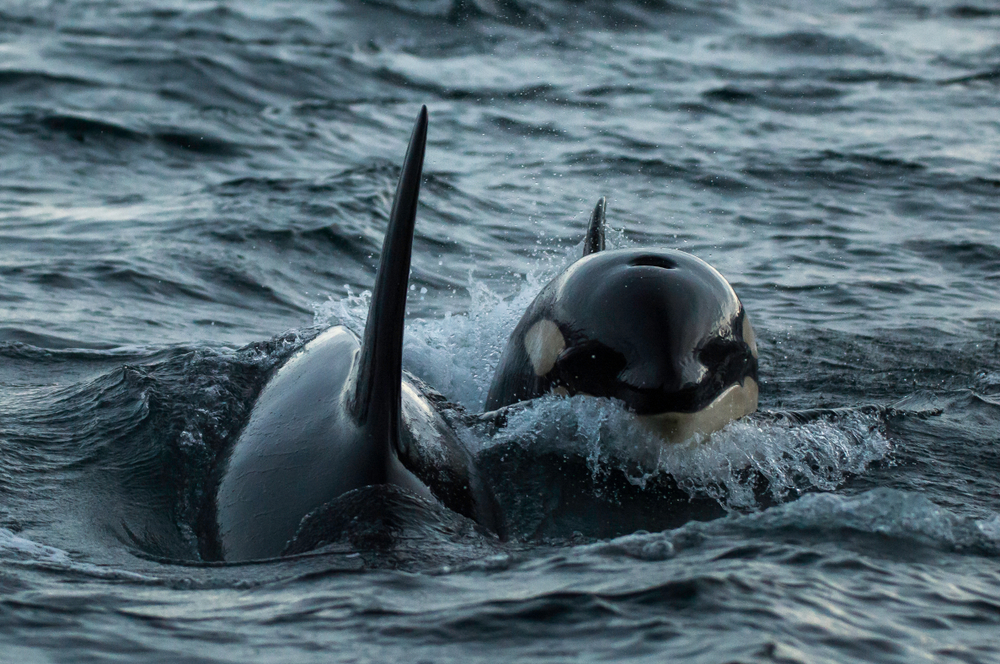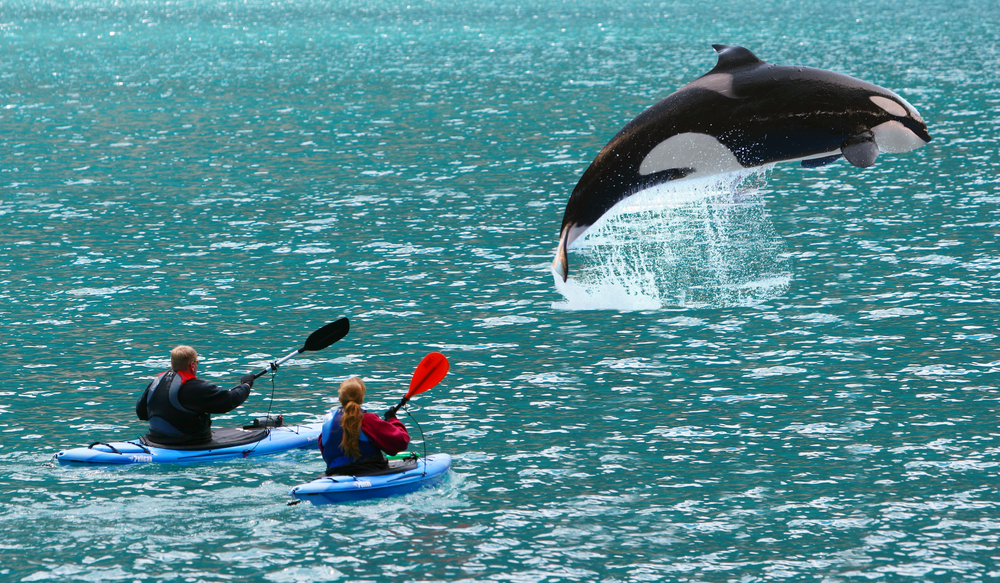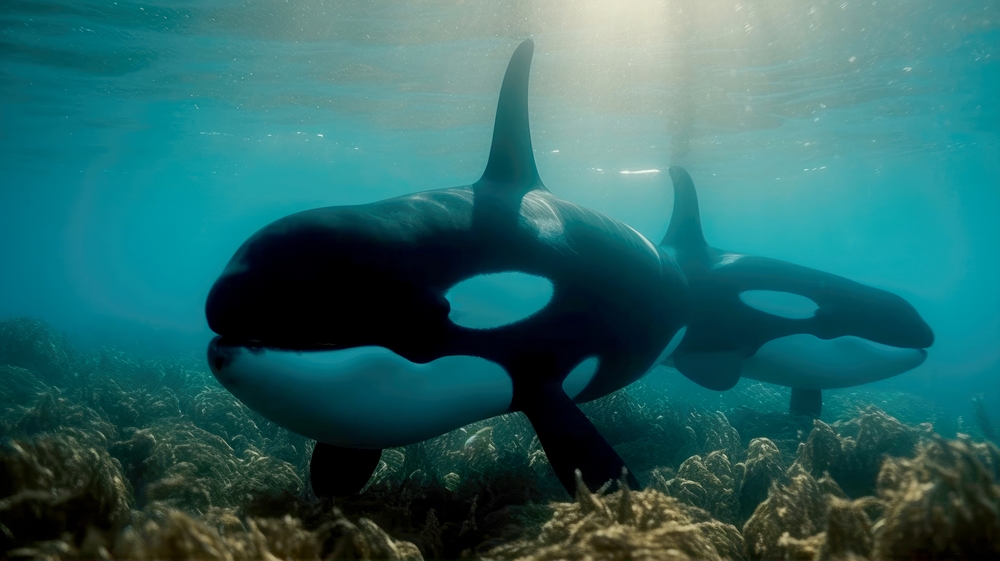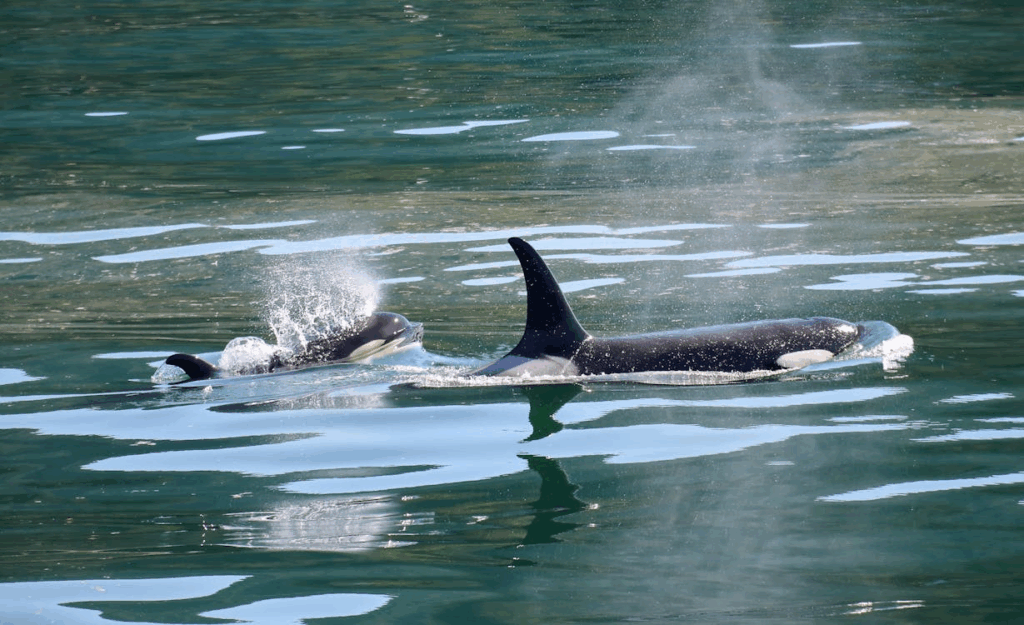Humans tend to view killer whales as majestic creatures to be feared and admired. They are popular performers at amusement parks for a reason. And people rally for their freedom from these parks. But while we love orcas, what do they think of humans? Researchers have documented cases when wild orcas approached humans to try giving them food. And they have no idea why.
Study records orcas giving food to humans

In these instances, the orcas dropped food in front of people. This was in the form of fish, birds, stingray, part of a whale, a turtle, and seaweed. Most of the time, they lingered to see how the person will react, and sometimes tried to give them more food. The study, published in the Journal of Comparative Psychology, includes 34 cases that occurred all over the world for over two decades. This included experiences of the authors themselves.
“Orcas often share food with each other; it’s a prosocial activity and a way that they build relationships with each other,” study lead author Jared Towers, the executive director of Bay Cetology, said in a statement. “That they also share with humans may show their interest in relating to us as well.” In 21 cases, the humans were on boats, in 11 they were in the water, and in two they were standing on the shore. Some of the interactions were captured on film or in photos, and others were told over in interviews.
Read More: Abandoned for Months: Orcas and Dolphins Trapped in Empty Marine Park
Orcas are intelligent and social

Keep in mind, the stories were only admissible in the study if the orca approached the people on their own and dropped food in front of them. If the humans initiated the contact, it wasn’t included. In 33 out of the 34 incidences, the killer whales waited to see the reaction. In 7 of the cases, they tried to bring more food after the subject rejected the first offering. Domesticated animals like cats and dogs often offer food to humans such as dead mice or birds. But this study is one of the first to document wild animals doing it.
The researchers attribute this unique act to the orcas’ natural intelligence and social drive. They often hunt prey much larger than themselves, and share leftover food with their kin to form bonds. They are also very playful. Researchers have documented them tossing and killing baby porpoises without eating them. However, they didn’t play with the food they offer to people in these 34 cases.
“Offering items to humans could simultaneously include opportunities for killer whales to practice learned cultural behavior, explore or play and in so doing learn about, manipulate or develop relationships with us,” the study authors explained. “Giving the advanced cognitive abilities and social, cooperative nature of this species, we assume that any or all these explanations for, and outcomes of such behavior are possible.”
“Not a surprise”

Erich Hoyt, a researcher at the charity Whale and Dolphin Conservation who was not involved with the study, complimented the research in an email interview with Live Science. “With all the comments about orca play behaviour in relation to the Iberian orcas bending and breaking rudders of boats, it could be easy to dismiss these [offerings] as isolated incidents representing no more than another kind of play,” Hoyt said. “But [the] authors point out that the provisioning/prey sharing happens equally between all sex and age classes, not just by the younger members who more actively engage in play.”
Meanwhile, Hanne Strager, a researcher and author who wrote “The Killer Whale Journals,” isn’t surprised by this behavior. “…Everybody who’s on the water with (killer whales) has experienced how inquisitive and curious they are and have had interactions where you know there’s something going on between us and them,” says Strager, who wasn’t involved in the study to CNN. Not only are orcas intelligent, researchers believe they have a type of neurons in their brains that are linked to empathy, which promotes the theory that the behavior is altruistic.
Netizens have their own humorous ideas about the orcas’ motives. Some suggest they are trying to lure humans to eat them the same way people use bait while fishing. (Keep in mind, there is no record of orcas killing humans in the wild.) Maybe they are trying to domesticate us as pets, just like we feed stray cats. Maybe they are apologizing for breaking boat rudders. Another theory is they are trying to bribe us to stop polluting the oceans. Or they are trying to train us to do tricks for their entertainment?
Read More: Terrifying Orca Recording Imitating Human Speech Stuns and Freaks People Out
Orcas are among the most intelligent and socially complex animals in the ocean. Their behavior goes far beyond what many expect from marine mammals. Here are some of the most fascinating things orcas have done:
1. Wave-Washing Prey Off Ice Floes
In Antarctica, orcas have been observed creating waves with their bodies to wash seals off floating ice. This is a highly coordinated group behavior that requires timing, communication, and precision.
2. Intentional Beaching to Hunt
Some orcas intentionally strand themselves on beaches to grab sea lions, then wriggle back into the water. This is extremely risky and is only known to be done by specific pods in Patagonia, passed down as a learned behavior.
3. Mimicking Human Speech
Captive orcas have shown the ability to mimic human-like sounds, including basic words. While they don’t understand language, this shows impressive vocal control and social curiosity.
4. Attacking Boats
In recent years, orcas off the coast of Spain and Portugal have started ramming and disabling sailboats. Theories range from playful behavior to learned responses from one agitated orca matriarch that spread through social learning.
5. Teaching Each Other New Techniques
Orcas learn hunting strategies from one another. For instance, some pods use fish as bait to lure birds, while others toss fish to stun them. These tactics are shared through observation and imitation, like culture in human groups.

6. Playing with Objects
Orcas have been caught playing with kelp, tossing jellyfish, and balancing objects like logs or even live prey on their heads. This shows both creativity and playfulness.
7. Forming Long-Term Family Bonds
Orca pods are matriarchal, and individuals often stay with their mothers for life. These pods use unique vocal dialects, hunt cooperatively, and seem to mourn lost pod members.
8. Attacking and Eating Great White Sharks
Some orcas specialize in hunting sharks and rays. In South Africa, orcas have been seen removing only the livers from great white sharks, leaving the rest of the body untouched. They know exactly where to bite, showing surgical precision.
9. Imitating Other Marine Mammals
There are recordings of orcas mimicking the calls of other species, including dolphins and sea lions. This may be used for hunting, deception, or play.
Read More: Scientist Witness Great White Shark Eating a Rival Shark For The First Time
This article was created with AI assistance and edited by a human for accuracy and clarity.
